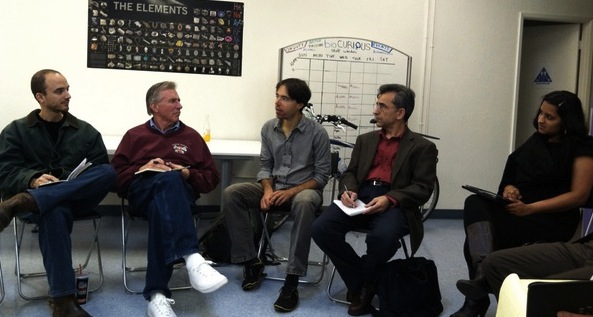Recap of QS Discussion Group
Alexandra Carmichael
March 17, 2012
George Lawton was kind enough to take notes at our most recent QS Discussion Group meetup. Here is his summary, below.
 The QS Meetup on March 13th in Mountain View was great fun, and covered a variety of topics ranging from nutrient tracking, classifying large archives of footage, quantifed-mind.com, and pH tracking, and newly disclosed interventions for mitigating the emotional knots associated with stressful events.
The QS Meetup on March 13th in Mountain View was great fun, and covered a variety of topics ranging from nutrient tracking, classifying large archives of footage, quantifed-mind.com, and pH tracking, and newly disclosed interventions for mitigating the emotional knots associated with stressful events.
The meeting began with a round of introductions in which people described some of their areas of expertise, research, and curiosity. It ended with smiles on everyone’s face.
The discussion quickly moved to interest in a recent Wired article, which suggested it was possible to mitigate the emotional impacts of traumatic memories. Some discussion pondered to what extent this intervention actually erased the memories themselves, rather than the emotional knots associated with it. In this procedure, participants were actively encouraged to recall some debilitating stressful event such as a war time tragedy or familial abuse, while under the influence of this chemical concoction.
Ryan B said that a number of important new chemical interventions were being developed showing promise in reducing the brain plaques commonly associated with Alzheimer’s disease. Ensuing discussion also considered the possibility that other chemicals such as MDMA may have similar promise in releasing the emotional knots associated with trauma. Alex Grey pointed out that long term effects on down-regulating brain chemical receptors has to be considered, as some chemical interventions like MDMA can lead to a deficit in the neurochemical receptors for serotonin or oxytocin that promote happiness.
It was also suggested that the use of humor may be a non-chemical intervention capable of the same effect. One viewpoint is that any given set of facts can be written as a drama, tragedy, mystery, or a comedy. Perhaps communications-oriented processes that help to see the humor in terrible tragedies may also help to relieve the emotional knots associated with trauma. However, the use of these sorts of techniques in American culture may be challenging to adopt, owing to a propensity to take ourselves too seriously.
Yoni Donner discussed his new research with http://www.quantified-mind.com/, which is a free web app for measuring a number of aspects of intelligence. He said the app takes about fifteen minutes to establish a baseline, and allows participants to track how different aspects of their cognitive performance change over time. He said that care was taken to minimize training effects, so that the tool is better able to track other interventions, training, nutrition, or environmental factors on various types of intelligence.
He noted that they decided to keep the interface as simple as possible so that it could be easier to use. Although the use of sophisticated brain tracking was considered, it was not included owing to the relative paucity of deployment and the logistical challenges associated with setting up and using existing brain training equipment.
Phil von Stade discussed his interest in deriving some meaning, doing research on, or creating art from the 20,000 feet of archived family movies, and thousands of hours of video recordings he has, dating back to the 1950s. In addition, he has also shot several gigabytes of his own picture and video logs. He pointed out that the sheer size of the dataset makes it difficult to find or organize content in a useful way. Some efforts have been made to create slideshows and stories from this archive.
Tools which are automatically able to tag content with metadata such as participants, date, emotional patterns, behavioral data, or even physiological data might be useful in helping to better index such an archive.
There was also some discussion about the use of pH data from urine and other bodily fluids as a marker for other changes in the body. Steven Fowkes said that tracking pH was good for indentifying various physiological states associated with inflammation, leaky-gut syndrome, and other health effects. Some practical considerations were noted with existing measuring techniques, which require one to hold a strip in front of a stream of urine and disposing of this without creating a mess. A pH sensor mounted in the toilet with a Wi-Fi connection could solve these challenges, and provide a potentially reliable, no-touch measurement system for health research.
This led to a discussion on some of the challenges associated with current limitations in describing food. As it stands, many tracking systems might consider wheat from different sources, production processes, and species as identical, while each may have wildly different cooking and health effects, noted Raj. For example early research suggested that high-meat diets were leading to high-level of cholesterol and fatty deposits in the late 1960s. Follow up research suggested that it was in fact a growth in the consumption of grain-fed cattle that were causing these effects.
There are also curious discrepancies and changes in the nutrient database compiled by the USDA, which is often used by tracking programs to estimate the nutritional composition of various foods. For example, the average levels of calcium for the same portion of kale and calcium dropped 10-fold between 1980 and 1990. Perhaps improvements in the farm-to-fork databases now being mandated in the US could help to rectify these discrepancies.


